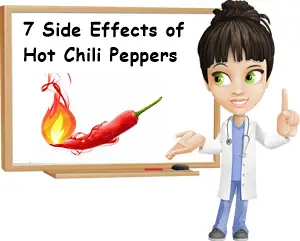Capsaicin, the main flavor-giving compound in hot chili peppers is a source of both wonderful health benefits and unpleasant side effects.
Despite its beneficial action on cardiovascular health, arthritis and other inflammatory conditions, capsaicin has other less desirable health effects for gastritis, acid reflux, hemorrhoids and most digestive disorders.
Paprika, the beloved spice mix, is made of both sweet peppers and hot chili peppers like cayenne and it too can trigger digestive discomfort in the form of heartburn, stomach pain, nausea or vomiting.
Hot peppers of all types, sizes and colors are eaten for their health effects, but for some people, the side effects outweigh the benefits.
They are one of those foods not everyone responds the same to.
As a result, eating hot chili peppers can be exclusively good for some people, whilst bad for others. While the side effects don’t cancel the benefits, if eating hot chili peppers seems to be making you feel worse, then they might not be the best choice for you.
Fortunately, there are plenty of other wonderful alternatives out there.

What are hot peppers bad for and why?
Generally, hot peppers should not be consumed by anyone suffering from inflammatory conditions of mucous membranes, notably gastrointestinal disorders like acid reflux or peptic ulcer. But the side effects of hot peppers are not limited to the digestive system. The biologically active elements in the peppers can affect the mouth, eyes, skin and several other systems and organs, depending on existing health conditions or sensitivities.
Find out below what are the
Top 7 Side Effects of Eating Hot Chili Peppers:
1-Flare up hemorrhoids
As a general rule, all spicy, hot foods are bad for hemorrhoids.
This means that someone with piles should avoid eating hot peppers, too much ginger, too much pepper and even too much turmeric (also read about the 5 reasons why turmeric is bad for you and the 7 reasons not to eat ginger). While otherwise healthy, pungent foods like hot peppers tend to badly irritate sensitive or already damaged tissues like hemorrhoids and generate inflammation and pain.
Hot chili peppers contain a powerful natural element called capsaicin as well as several other compounds related to it, all of which give spiciness to the peppers. These same compounds make them healthy for many people and good for medical conditions like arthritis or high blood pressure.
At the same time, they are bad for hemorrhoids because the already inflamed blood vessels are irritated by capsaicin, resulting in more inflammation, pain and even bleeding.
Discover more foods to avoid eating for hemorrhoids.

2-Irritate the stomach lining and worsen gastritis
Capsaicin and other pungent elements in hot peppers irritate mucous membranes they come into direct contact with, especially the stomach lining.
Eating hot peppers in large amounts can worsen gastritis and cause nausea, vomiting and diarrhea with strong burning sensations. The peppers are also bad for those with stomach ulcer.
3-Cause acid reflux and heartburn
Regular consumption of spicy foods such as hot peppers can cause gastroesophageal reflux disease, or GERD. Because of their irritant quality, hot peppers lead to heartburn and acid reflux.
They irritate the stomach lining, causing the gastric juices to rise up into the esophagus, hence the burning sensation in the chest.
The more hot peppers you eat, the more severe the heartburn and the acid reflux. Some people also experience headaches and feelings of irritation as a result of the discomfort.
4-Cause indigestion
The irritant characteristics of capsaicin and other pungent elements in hot chili peppers can work up the stomach and cause severe indigestion.
Stomach pain, a burning sensation in the chest, bad taste in the mouth and nausea may be present. Rapid heartbeat, dizziness and sweating are also common if the indigestion is severe.
5-Strong skin irritant
Despite their wonderful health effects for the cardiovascular system and analgesic properties, hot chili peppers are actually skin irritants and can cause skin injury with sufficient exposure.
The compounds that give the peppers their pungency are known irritant substances and can cause a rash, itching and a strong burning sensation with stinging pain.
It’s advisable to avoid rubbing your eyes or other sensitive areas and wear gloves when you handle extremely hot peppers.
6-Cayenne peppers as a cellulite treatment
They are quite popular remedies for cellulite these days. Capsaicin, the main biologically active ingredient in hot peppers is added to creams intended for topical use and said to help burn excess fat deposits and improve skin appearance by reducing cellulite.
But the burning sensation you feel is not the cream burning excess fat, it’s capsaicin irritating your skin. It’s the same burning feeling you get in the mouth, in the chest or in the stomach after eating hot peppers.
Cellulite reduction with the help of cayenne or other hot peppers creams or treatments is a myth and is not effective.
7-Nose, mouth and lungs irritant
Hot peppers are a strong irritant for the nose and mouth and also lungs.
Eating the hot peppers or breathing in the hot pepper powder can cause severe discomfort, redness, sneezing and a strong burning feeling, in more serious cases a skin reaction similar to a burn or even an asthma attack as capsaicin is also a lung irritant.
8-Trigger allergy and asthma attacks
Hot chili peppers allergy can range from mild to severe. Mild reactions include redness, itchiness and burning sensation, runny nose, sneezing, watery eyes, conjunctivitis and others.
Severe allergic reactions to hot chili peppers are breathing difficulty causing the airways to close up, severe swelling of the throat, eyes, mouth or entire face and ultimately, anaphylaxis.
Because of their pungency and the fact that they irritate the lungs, hot peppers can trigger asthma when inhaled.
Some people are allergic to the compounds that make the peppers hot, like capsaicin. Other may be allergic to all pepper or to multiple nightshade family members like peppers, tomatoes and eggplants.
Simple mouth and nose reactions of sensitivity to hot peppers can build up over time to become more serious and lead to the development of an allergic-reaction proper.
It is advised to avoid the peppers and anything containing them (they are used as color additives in many products, including vitamin supplements).
